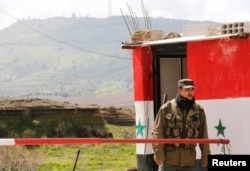Local and regional reactions are mixed over the recent U.S. decision to recognize Israel's sovereignty over the Golan Heights. Some say the move raises tensions between Israel and its Arab neighbors, while others contend the move does not change the reality on the ground.
The U.S. is the first country to recognize Golan as Israeli territory. The rest of the international community considers it Israeli-occupied. President Donald Trump said keeping the Golan Heights under Israeli control "is of critical strategic and security importance to the State of Israel and regional stability."
The Golan Heights was captured from Syria in the Six-Day War in 1967, and Israel has controlled the strategic region ever since.
"The U.S. decision is setting a dangerous precedent," said Ahmed Rahal, a former Syrian army general who currently is a military analyst based in Istanbul.
"It's not only dangerous in the context of Arab-Israeli conflict, but also in the global context," Rahal told VOA. "Other countries will be more inclined to attack their neighbors, annex their territory and permanently claim their sovereignty over it, using the argument that America has legitimized this behavior in the case of Golan," he added.
Other analysts, however, believe the U.S. move changes nothing on the ground because Israel has controlled the Golan Heights for more than four decades.
"I don't think it will have a major impact on regional security," said Jonathan Spyer, a research associate at the Jerusalem Institute for Strategic Studies. "Israel's de facto control of the Golan is not in doubt, and there is no likelihood in the foreseeable future of any serious attempt by any force to change this situation."
Some Israeli experts charge that the resource-rich region has been of strategic significance to Israel and has served as protection against Israeli foes in the region.
"The Golan Heights is very important for us security-wise," said Yaakov Amidror, a former National Security Adviser in Israel. "It is a very important element in our ability to defend Israel. Without us being in the Golan [Heights], Hezbollah, the Iranian and Shi'ite militias in Syria could end up near the Sea of Galilee," Amidror, who also has served as a military officer in the Golan Heights, told VOA in a phone interview.
He added that before Israeli forces took control of the region, it "was used by the Syrians to bomb Israeli settlements."
Syria's claim
Some experts say they believe the Golan issue will become central when a political solution is reached in Syria and the country comes out of the ongoing war.
"When a democratically elected government comes to power in Syria, it could seek to retake the Golan from Israel," analyst Rahal said. "That's when a potential legal, political and possibly military conflict between Israel and Syria could arise."
Amidror disagrees. "A regime change in Damascus would present a chance for Israel to have an agreement [with a new Syrian government] over the Golan Heights," he said, adding, "If there is a regime change in Syria, dialogue would be much easier."
The Golan Heights is mostly populated with Druze, an Arabic-speaking minority, many of whom still have relatives on the Syrian side of the border.
Protests
Residents in the Druze village of Majdal Shams staged a protest this week to reject Trump's decision, chanting that the Golan was Syrian and waving Syrian and Druze flags.
"We denounce Trump for gifting our Golan to Israel. The Golan is not a property of Trump or Israel. It is a Syrian land and will always belong to Syria," Sheikh Mahmoud Nazeeh, a Druze leader, told Syrian state television Wednesday.
But given the volatile situation in Syria, many Druze residents of the Golan Heights seem supportive of preserving the status quo in their region.
"Nobody can change the reality here," said Faiz Zahraddine, a 40-year-old resident of Ein Qiniya, a Druze village in the Golan Heights. "We have been living under Israeli rule for decades. We have established our lives and careers here. Many people don't want this to change."






